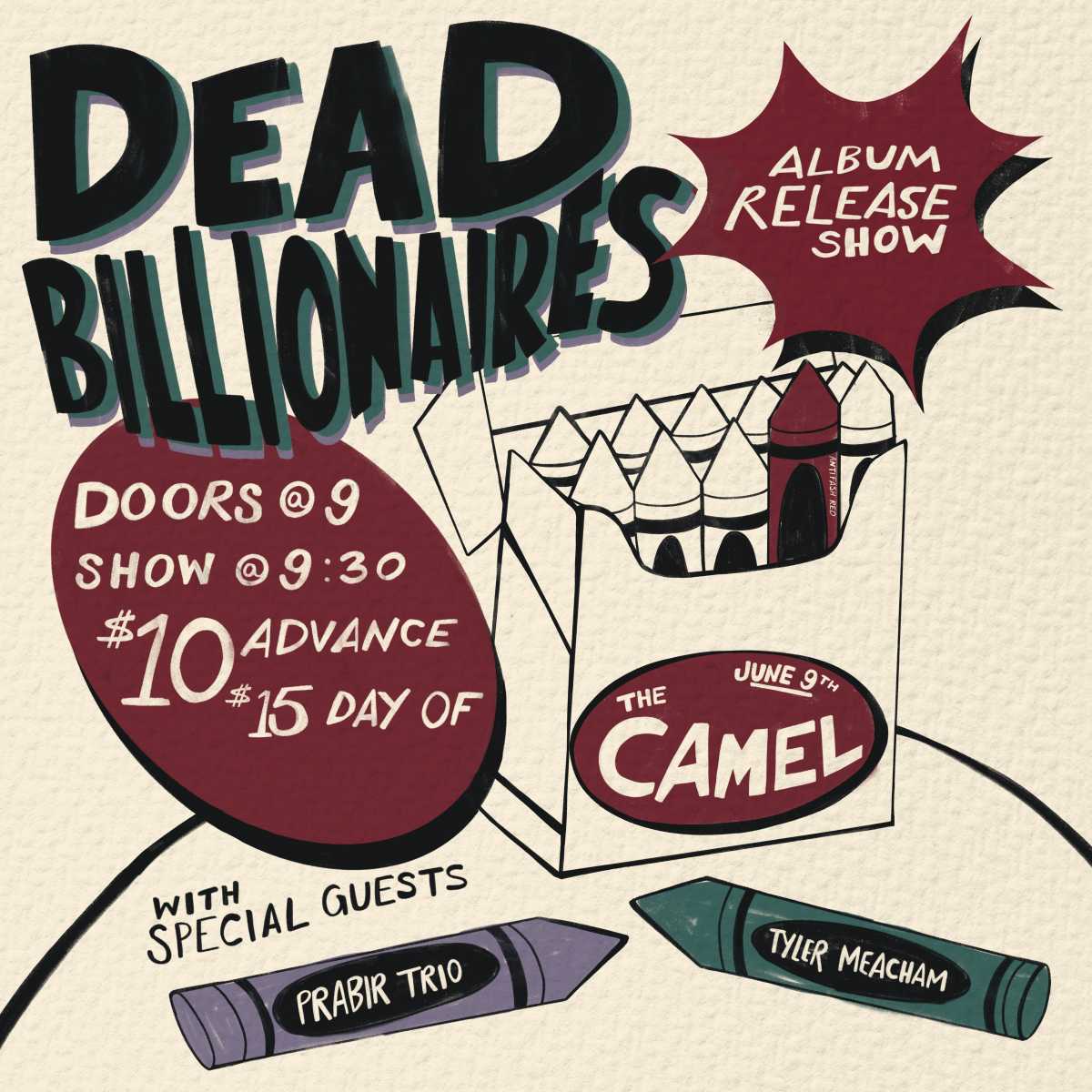Premiere: Dead Billionaires Activate & Exhilarate On Disaster Preparedness Coloring Book
In the early ’90s, FEMA, the American agency in charge of emergency response, funded the creation of coloring books themed with disaster preparedness. The idea was to help teach a generation of our population how to endure any calamity that may befall their area. Earthquakes, hurricanes, droughts, blizzards; all destructive acts of nature were covered, but what wasn’t covered were other calamities. Calamites that weren’t born out of a healthy ecosystem built on cycle and harmony. No, this primer conveniently left out man-made disasters that can often be more devastating and dire than a flood or fire. You know, things like a pandemic causing a sizeable chunk of service workers to instantly be laid off, leading to instant poverty for millions of Americans. Or how about greedy corporate interests fraudulently inflating prices that inevitably spur an anxious recession?
There’s no coloring book or after-school special for those things, unfortunately. But thankfully, there is a new record by the rock band Dead Billionaires that can help you weather that plastic storm with some musical support. Disaster Preparedness Coloring Book is a seven-song rock screed that confronts the nefarious neglect and gruesome greed that have damaged essential pillars of society in such a way that the damage is nearly terminal. Musically thrilling and lyrically galvanizing, this record tracks social and political unrest from a period of over six years, following the slow descent into radicalization that was accelerated by callous responses to a worldwide threat. It’s a powerful record that serves as a wake-up call to the man-made terror inflicted on the world that permeates every facet of our life from uncomfortable seasonal changes to debilitating workloads. Out everywhere on Friday, June 2nd, The Auricular is thrilled to premiere this album today with an exclusive stream as well as a detailed look at each weighty song.
Formed and led by activist songwriter and wired guitarist Warren Campbell, the band traces its origin back to Little River Creek Police, a folk-punk project that grew out of Richmond’s bountiful open mic scene in the late 2010s. By the turn of the new decade, the act had evolved into a new band with a name that spells out its progressive mission statement from the get-go. The Dead Billionaires EP came in June of 2021 with three songs that captured their dynamic live performances and showcased their spunky sound and message. In some ways, the punchy EP serves as a precursor for the witty contempt that makes up Disaster Preparedness Coloring Book, their first album chockfull of infectious melodies that ease the pressure and strain of modern life. It’s a bold step up for the band that captures Campbell’s growth, personally and musically, over the last few years, some of which was done out of self-preservation due to the societal chaos swirling around.
On the record, Campbell is joined by drummer Hunter Rhodes and bassist Nick Trbovich who help breathe life into each composition with riveting performances that temper the original insight and snark of punk with a disarming array of rock styles. As a band, they fully lock into each song’s nuanced message, performing with such vigor and sincerity that it delivers an exuberant sound that’s equally as stirring and heavy as the lyrical content, something that will be on full display when they play The Camel on Friday, June 9th for their album release show (more details at the end of the article). Recorded by renowned local musician and producer Chip Hale, the band presents as a fully unified front behind Campbell’s rousing drive, one that seeks to build a vibrant sound as much as it does a vivid message.
So much to digest within the record, we thought it best to analyze this record alongside its architect, Warren Campbell, who gave us a track-by-track breakdown of each nuanced song that help comprise a true survival guide for societal hazards.
“Curb”
A ramshackle jam that serves as the thesis statement for the record, this song was born out of the uncertain reality millions of Americans faced during the early stages of the pandemic. “I didn’t have a productive lockdown — I focused on surviving,” Campbell stated bluntly. “When I was unemployed, I had maybe a burst of creativity at the beginning and I wrote the chorus during that. The rest of it came along like once we could actually rehearse again. Me and Nick Trbovich got together and figured out the rest of it.”
The song erupts with a focused attack on capitalism, sharpened and honed from an experience of being discarded by the system that showcases the wide-eyed promise of the free market and its destructive consequences. “I always liked the idea of trying to put a song together that had two distinctive parts: the chorus is the kind of unrelenting drive of the system that we live in, but then the verses are a person speaking to another person about ‘how are we gonna figure this out?'”
The music video finds the band in a humorous but distressing situation as they embrace the monetization of art before discovering its ill effects. “I had the idea for a long time,” Campbell stated. “‘What if the band becomes a publicly traded entity?” We have to sell, boost the value of the company. It just grew from there into something really fun to watch.”
“Straight Shooter”
A buzzing remedy that addresses precarious work-life balance, harmful remedies, and oblivious ignorance, “Straight Shooter” showcases the nuanced style Campbell writes in, where events with global implications are likened to bad habits that fill our day-to-day life.
To Campbell, the personal implications of balancing rest and production drive the song, something he knows very well from trying to make space for artistic ambition. “You’re trying to make sure music is a priority for you,” Campbell detailed. “You stretch yourself thin and I think there’s a little bit of masochism that comes along with that. So you indulge in creature comforts when you should be resting or when you should be making productive steps for your health. But the environment that you’ve been in doesn’t take that into consideration and it’s easy to view self-destruction as indulgent and pleasurable.”
“I can’t remember how that chorus got written,” he continued. “Just having a sick day where you think about your mental space and your physical space. If they get too detached, you can just watch TV and think that you’re doing something good for yourself in a situation where you’re so disconnected from your body because of your livelihood or whatever situation you find yourself in that is brought on by the pressures of surviving in a world like the one we live in today. You have no relationship with yourself beyond your consumption.”
The video frames all of this within the context of a boisterous house party, where the desire to partake contrasts with the need to recuperate. And when recuperation is finally prioritized, it’s done so with such inorganic methods that it just sets you up for a woeful stretch of days full of bad choices, choices like… making your band a publicly traded entity?
“Fun little video tidbit: I am going to bed at the end of the night with my computer in front of me and then the ‘Curb’ video starts the next day,” Campbell revealed. “It’s meant to be the next day. There’s a connective thread through all of our songs no matter what order you listen to them in.”
“Pink Slip / White Truck”
The other “true pandemic song,” according to Campbell, this track is a driving diatribe against misguided priorities that were running rampant as people fought for their lives, physically and financially, in March of 2020. “Basically, there was this white truck that was parked across the street from where I had lived in 2020,” he remembered. “This truck was pretty dilapidated and had like a flat tire and was just sitting there. Then I noticed that there was a pink sticker that the state had put on there and then it was gone soon after. I just remember thinking, ‘Man, thousands of people are dying every day, but we’re still finding a way to tow this guy’s car.”
“That’s where I thought of the line when you put the coins in the meter and nothing comes out the other side,” he continued. “Just this broken social contract.” Initially conceived during the beginning of the pandemic, the song would find its final form after that summer with the George Floyd protests looming over society.
“That’s where the line ’50K and armed to the T, but don’t you know that we got mouths to feeds’ came from,” Campbell recalled. “We were halfway through the pandemic and protests and I just saw that the Virginia State Police had invested another $50,000 into riot gear so they could repress citizens. It was very discouraging. The line ‘I don’t want to be a pawn anymore’ came about then because of the impending implicitness of your social status in our world. I was just thinking, ‘I don’t want to be a part of that at all.’ This song really goes through all stages of that pandemic era.”
“15 Words”
A punk assertion of anti-white supremacy, this song was actually recorded first under the Little River Creek Police banner back in 2020 before being refined and enhanced for this record. Its genesis date back to the infamous Unite The Right rally. “I was there in Charlottesville in August of 2017 when Heather Heyer was killed,” Campbell said. “I was a counter-protester that day and maybe 300-400 feet away so I saw the car ram into the crowd and everyone jump back.”
Initially, Campbell couldn’t find a nuanced approach to convey the feeling of anger and grief from that day, but the articulate songwriter eventually landed on an idea that would make sense not just as a rock anthem, but also as an album cleanser. “I was inspired by other artists that take one phrase and repeat it throughout the song,” he detailed. “Like Titus Andronicus. They have such lyrical songs and I very much appreciate how they make music and then basically once per album, they have some banger where it’s just one phrase repeated.”
For this phrase, he approached the reviled 14 words, a Nazi doctrine that has crept its way into society through broadcasted dog whistles or thinly veiled policy measures. “’15 Words’ was my way of adding on one more word to add my disgust,” Campbell explained. “You’ll hear white supremacists chanting it at rallies. Having been [in Charlottesville] and having seen the violence that white supremacists can [do] really drove the anger.”
“Checks”
Another departure for the record, this song embodies a more soothing ambiance with vocals that almost transport Campbell from activist to crooner, although it may be one of the weightier songs on the record when its timeless meaning is fully realized. The song was born out of a weekend retreat Campbell took to an Airbnb in the woods.
“I had come across this very strange astrological book that was in the place I was staying,” he remembered. “I was reading about it and it was talking about the birth of the universe and all of that. I just thought about how peaceful I felt away from my job, which I absolutely hated at the time. The beachy feel of the song was born out of that mindset. Just a vacation song amongst all this other stuff.”
“Let’s use our welfare checks to play the lottery,” pleads Campbell in the song’s chorus, a cheeky line that also showcases the innate charm of his songwriting. Written years before the pandemic though, the song took on new meaning as Campbell found himself unemployed at the start of lockdown.
“I thought it was pretty funny at first when I was relieved of my restaurant job,” Campbell stated. “‘Oh, now it’s time to make good on that song you wrote!'” Its resonance years later only shows Campbell how the core messages of these songs haven’t been addressed by society despite their pressing importance. “I mean, we went through a pandemic and those protests for George Floyd and what’s different?” he levied. “Do we have health care for everyone? No. Do we have anything that will protect black people from police violence? No. They’re building copy city in Atlanta, pretty much against the wishes of the people there, and the whole purpose is to make it so police forces can do crowd control better. God damn. You can feel the grips tightening, but it’s been happening since long before the pandemic made people aware.”
“Stoplight”
The oldest song on the record dating back before anyone had PTSD about a mask or a tiki torch, “Stoplight” addresses the uncertainty of life and separated intimacy. “Lyrically, this song is about living far away from somebody that you love,” Campbell explained, “but it’s also about how other thoughts coincidence with that. Thoughts like ‘How am I going to live my life?’ Just a big phrase of unknowing in my life, to borrow a title of a Tyler Meacham track.”
Here, Campbell shies away from the systems in place that oppress and distress and instead looks at ways to cope and rejuvenate despite all the uncertainty swirling around. “Less about the systems and more about how am I going to cope with distance or how am I going to make a life in whatever way I can? It’s the oldest track and probably the most introspective in this case.” Lyrically, it serves as a beginning point for the downward spiral of activism and advocacy the record documents, but in placing it this deep into the record, it also shows how a communal movement doesn’t necessarily erase the self-doubt within, something we all have to learn about whether we champion for a cause or not.
“Stones”
With a swaying country rock strum and flickers of honky-tonk jamming, the closing track to Disaster Preparedness Coloring Book departs the most from the album’s sound while still featuring signature hallmarks of a Dead Billionaires song. “I call that our classic rock jam,” Campbell said with a laugh. “It came from a little bit of inspiration from The White Stripes. They’d always put a weird one on the end of their albums.”
Outside of maybe “Curb” at the beginning of the record, “Stones” sounds like the most fun the band has together musically, something that helps build on the connective and hopeful lyrical message. “We wanted to put something positive at the end and ‘Stones’ is about finding your way,” Campbell said. “It’s just the acknowledgment that people live lives and it’s easy to think, “Oh, why is life so hard for me but it’s so easy for them?’ But really, I have problems but I’ve got good people around. Life is hard, but we persevere. We just do.”
Ending on a note of perseverance feels right for a record that’s titled in a way to prepare its listeners for overwhelming disaster. Yes, we need to understand why these things happen. Yes, we need to be able to vent our frustration and rage. But we also always need to keep moving forward no matter what and that’s exactly what Disaster Preparedness Coloring Book does. It moves through time periods with a tenacious heart and open mind allowing it to weather each storm and come out of it better and stronger in the end. Resiliency has always been one of humanity’s greatest strengths and it’s something still vital today, as you can feel on this sweeping record that moves from one tragedy to the next while still looking for ways to better the world around and within. No matter what systems are in place, that spirit will never die… especially with bands like Dead Billionaires around.
Disaster Preparedness Coloring Book will be released to all streaming platforms on Friday, June 2nd and you can pre-order it digitally (or on vinyl) through Bandcamp at this link.
Dead Billionaires is celebrating the release of the new record on the evening of Friday, June 9th alongside Prabir Trio and Tyler Meacham at The Camel. Doors open at 9 with the music kicking off at 9:30. Tickets are $10 in advance and $15 the day of the show. For more information, you can click the link here or check out the show flyer below.





